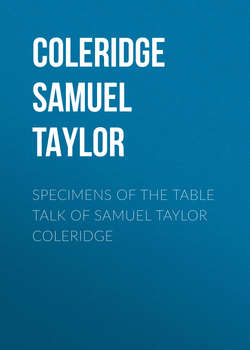Читать книгу Specimens of the Table Talk of Samuel Taylor Coleridge - Coleridge Samuel Taylor - Страница 46
TABLE TALK
May 9. 1830
ОглавлениеPERSIAN AND ARABIC POETRY.—MILESIAN TALES
I must acknowledge I never could see much merit in the Persian poetry, which I have read in translation. There is not a ray of imagination in it, and but a glimmering of fancy. It is, in fact, so far as I know, deficient in truth. Poetry is certainly something more than good sense, but it must be good sense, at all events; just as a palace is more than a house, but it must be a house, at least. The Arabian Nights' Tales are a different thing —they are delightful, but I cannot help surmising that there is a good deal of Greek fancy in them. No doubt we have had a great loss in the Milesian Tales.47 The book of Job is pure Arab poetry of the highest and most antique cast.
Think of the sublimity, I should rather say the profundity, of that passage in Ezekiel,48 "Son of man, can these bones live? And I answered, O Lord God, thou knowest." I know nothing like it.
47
The Milesiacs were so called, because written or composed by Aristides of Miletus, and also because the scene of all or most of them was placed in that rich and luxurious city. Harpocration cites the sixth book of this collection. Nothing, I believe, is now known of the age or history of this Aristides, except what may be inferred from the fact that Lucius Cornelius Sisenna translated the tales into Latin, as we learn from Ovid:—
Junxit Aristides Milesia crimina secum—
and afterwards,
Vertit Aristidem Sisenna, nec obfuit illi
Historiae turpes inseruisse jocos:—
Fasti, ii. 412-445.
and also from the incident mentioned in the Plutarchian life of Crassus, that after the defeat at Carrhae, a copy of the Milesiacs of Aristides was found in the baggage of a Roman officer, and that Surena (who, by the by, if history has not done him injustice, was not a man to be over scrupulous in such a case,) caused the book to be brought into the senate house of Seleucia, and a portion of it read aloud, for the purpose of insulting the Romans, who, even during war, he said, could not abstain from the perusal of such infamous compositions,—c. 32. The immoral character of these tales, therefore, may be considered pretty clearly established; they were the Decameron and Heptameron of antiquity.—ED.
48
Chap. xxxvii. v. 3.
